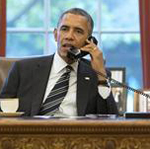 AFP: The White House urged Congress on Thursday not to tie its hands in nuclear talks with Iran, as hawks sought stronger sanctions and to limit its power to offer inducements to Tehran.
AFP: The White House urged Congress on Thursday not to tie its hands in nuclear talks with Iran, as hawks sought stronger sanctions and to limit its power to offer inducements to Tehran.
By Stephen Collinson
 Washington (AFP) — The White House urged Congress on Thursday not to tie its hands in nuclear talks with Iran, as hawks sought stronger sanctions and to limit its power to offer inducements to Tehran.
Washington (AFP) — The White House urged Congress on Thursday not to tie its hands in nuclear talks with Iran, as hawks sought stronger sanctions and to limit its power to offer inducements to Tehran.
As negotiators from Iran and major world powers, including the United States, edged close to an interim nuclear deal in Geneva, skepticism remains rife in Congress.
A group of bipartisan senators is calling for tougher sanctions against Tehran, even as talks take place in Geneva.
And Republican Senator Bob Corker raised the prospect of legislation to limit Obama’s power to waive some existing sanctions, as part of an interim deal designed to test Iran’s willingness to comply with restrictions on its nuclear program.
“It is important for Congress to reserve its ability to legislate for the moment when it’s most effective in order to give the current P5 plus one negotiations the best chance to make real progress,” White House spokesman Jay Carney said.
“Our view has been that we need to allow for a pause here so that we can explore the potential represented by these serious and substantive negotiations,” Carney said, when asked about the threat of tougher sanctions than those already hurting Iran’s economy.
Both Obama and Iranian President Hassan Rouhani find themselves challenged by hardliners in their respective capitals as they pursue a deal to end a long nuclear showdown short of US military action.
Congressional sources say there remains little support for any easing of sanctions at this point, but substantial backing for toughening the regime among lawmakers who think it will make Iran more compliant to Western demands.
But the White House fears Iran will interpret a new layer of sanctions as a sign it is not serious in the talks. Officials also fear tough action by lawmakers will bolster conservatives in Tehran and undercut Rouhani’s diplomatic initiative.
Carney stressed that Obama had no intention at this point of softening the “core architecture” of sanctions with Tehran.
But he said Washington was contemplating “limited, targeted and reversible relief” in return for Iran taking steps to halt advances in its nuclear program which the West believes is geared towards producing weapons.
Carney and other US officials declined to offer details of the proposed deal.
Reports from Geneva suggest those steps will include limits on Iran’s enrichment capacity, verification steps and restrictions on its stockpiles of nuclear material and its nuclear facilities.
The interim agreement would be designed to build confidence on both sides with a view to concluding a final deal.
Carney said the president envisaged only limited relief for Iran from economic sanctions, so pressure could be reapplied if necessary.
“If Iran does not live up to its commitments, the temporary modest relief would be terminated, and we would be in a position to ratchet up the pressure even further by adding new sanctions.”
But key figures, from both parties on Capitol Hill, want to ratchet up pressure on Iran regardless.
Bob Corker, the top Republican on the Senate Foreign Relations Committee, is contemplating a measure that could limit Obama’s flexibility in a limited effort to ease sanctions.
“We?ve crafted an amendment to freeze the administration in and make it so they are unable to reduce the sanctions unless certain things occur,” Corker told the Daily Beast website.
“They have the ability now to waive sanctions. But we?re very concerned that in their desire to make any deal that they may in fact do something that is very bad for our country.”
One option for Corker would be to attach a measure to a bill setting the budget for the Pentagon, which would make it tough for Obama to veto without throwing financing for the entire US military into chaos.
Carney would not say whether Obama would veto such a measure if it reached his desk. But he hinted at something White House officials say privately — that thwarting the negotiating process could put Washington and Tehran on a dangerous path.
“The willingness to pause while we explore this possibility is really a demonstration of support for the possibility of a peaceful negotiated resolution to this issue rather than a march to war,” he said.


